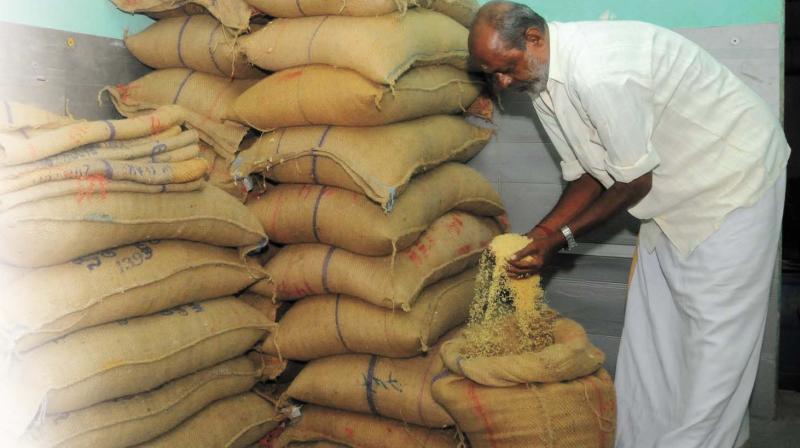National Food Security Act leaves Kerala in a quandary

Thiruvananthapuram: After being driven to the wall with the central government deciding to cut the APL quota for rice and wheat, the state government has reluctantly decided to implement the National Food Security Act (NFSA) in the state. The joint action council of ration dealers’ organisations has planned to shut down the ration shops and take out an Assembly march on Monday, urging the government to redress their grievances while implementing the NFSA. Food and Civil Supplies Minister P. Thilothaman said that the Act would come into force on November 1 by stamping the present ration cards as priority and non- priority, instead of BPL and APL.
However, he admitted that the initial list of beneficiaries would be published by January 2017 only. The new ration cards will be distributed by February to complete the process by March. The government will launch a pilot project to supply ration items at the doorsteps, starting November 1, Mr Thilothaman said. This is meant to prevent diversions. Kerala Congress (Jacob) leader Johnny Nellore, the president of All-Kerala Ration Dealers Association, said that with the Centre suspending the APL quota allotment, wheat will be supplied to the state at the minimum support price (MSP) of Rs 15.25 a kg and rice at Rs 22.54 a kg instead of the APL rate of Rs 6.10 a kg and Rs 8.30 a kg respectively.
There are a total of 82 lakh cards in the state. The total allotment would be reduced from 15.69 lakh metric tonnes a year to 0.13 lakh tonnes per year once the Act is enforced. The BPL category would be converted into priority category. The number of priority category cards would be increased from the present 20 lakh BPL cards to 32 lakh. The monthly Central allotment to the State is 47,800 tonnes for distribution to APL families. As per the present scheme, families irrespective of the size were getting 25 kg of rice per month. With the introduction of the NFSA, the quota would be reduced to 5 kg a person. This means a two- member family would get only 10 kg rice. This is inadequate in a state where rice is the staple food, Mr Nellore said.
The Act will do away with BPL and APL categorization and a large number of families will be left out of the public distribution system. The new categorization would be priority and non-priority, Mr Nellore said. Mr Babychan Mukkadan, general secretary of All-India Ration Dealers Association, said the priority list should have 52.63 per cent beneficiaries from urban areas and 39.5 per cent rural. This would push out 1.79 lakh people from the purview of the PDS because he Act provides for only 10.13 lakh tonnes of grains per month. Parliament passed the Food Security Act in September 2013.
However, the UDF government, which was in power in Kerala then, had raised concerns that a large section of people would be thrown out of the beneficiary list and sought more time for its implementation. End-to-end computerization will be introduced encompassing biometric validation based on Aadhaar, complete process and work flow- based transparency portal with minimal human intervention, integration of office automation for civil supplies department, door-to-door delivery of foodgrain by the state government and creation of intermediate godown and storage space for stocking a quarter’s allocation of foodgrain. The Act also placed an obligation on the state to provide five kg of grains per person per month at a subsidized rate of Rs 2 to Rs 3 per kg. All states except Tamil Nadu and Kerala have introduced the programme.

